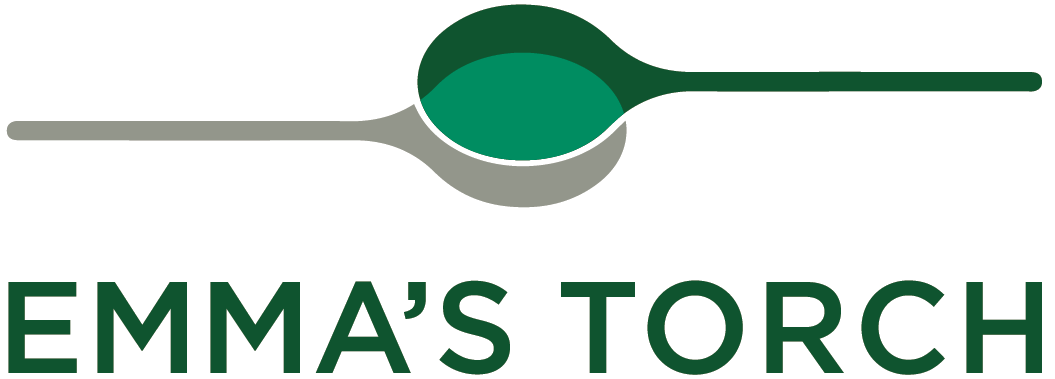Emma's Torch Featured in The Guardian
The Guardian covered our December holiday dinner, and we could not be more proud of our students! The piece features one of our students, “Aya,” a refugee from Iraq who keeps her identity hidden to safeguard her Iraqi family.
“Aya fled Iraq two years ago, fearing persecution because her husband was a professor. Violence against academics became common after the US-led invasion in 2003; the couple were being threatened for her husband’s refusal to obey militias. ”
Taste of liberty: New York restaurant serves up refugees' dishes from home
Emma’s Torch teaches those fleeing persecution skills for a career in the kitchen – and lets them show off their culinary culture
Amanda Holpuch in New York
Mon 31 Dec 2018
‘There is an incredible amount of value of welcoming in refugees and it benefits us from an economic perspective, it benefits us in terms of flavors and cuisines.’ Photograph: Alleko/Getty Images/iStockphoto
Culinary adventures are woven into the fabric of New York City. But in Brooklyn one December night, only one restaurant could offer a five-course meal that began with salmon cake and couscous from Mali and ended with an Iraqi dessert, including in between dishes from Honduras and China.
The restaurant is Emma’s Torch, a non-profit that teaches refugees, asylum seekers and survivors of trafficking the culinary and communication skills needed for a career in the kitchen. Six days a week, diners are offered a menu described as: “New American cuisine – prepared by our new American students.”
The restaurant began as a pop-up last year before expanding this summer into a bright, airy restaurant known for its earthy black-eyed pea hummus garnished with dried chillies. The New Yorker food critic, Hannah Goldfield, touted their “perfect shakshuka” served during weekend brunch service in her August review of the restaurant.
In 2019, they will open a second space at Brooklyn Public Library.
Emma’s Torch is named for Emma Lazarus, the poet whose words are inscribed on the pedestal of the Statue of Liberty: “Give me your tired, your poor, your huddled masses yearning to breathe free.”
On one night each month, Emma’s Torch is also the site of a graduation dinner that showcases the flavors of students’ homes, such as the lotus root dyed pink with dragon fruit sauce that was prepared by a Chinese student for the second course of the December dinner.
Before the first course was served, as the clock ticked down, the restaurant’s founder, Kerry Brodie, spoke over the sounds of sizzling pans.
“There is an incredible amount of value of welcoming in refugees,” she said, “and it benefits us from an economic perspective, it benefits us in terms of flavors and cuisines.”
In an eight-week, paid apprenticeship, trainees learn how to properly use knives to slice, dice and chop. They also take English classes and participate in mock job interviews. They receive 400 hours of culinary training and are paid $15 an hour for their work at the restaurant and on catered events. In 2017, every graduate was placed in a culinary job.
“The level of training we can provide our students is unparalleled,” Brodie said, “because by the time they are graduating and we are helping them secure a job, they know what it is like to work in a restaurant and they are ready to take on new jobs and, more importantly, to begin new careers.”
On the day of the December dinner, one of the four trainees in the graduating class was nervous. After concluding her meal prep, however, her nerves gave way to high spirits, even as she described the dangerous circumstances that led her from Baghdad to Brooklyn.
Aya fled Iraq two years ago, fearing persecution because her husband was a professor. Violence against academics became common after the US-led invasion in 2003; the couple were being threatened for her husband’s refusal to obey militias. Aya asked for her real name not to be used in this piece, because she feared for the safety of family members still in Iraq.
Granted refugee status, Aya arrived in the US in January 2016. She studied computer programming for two years but that gave way to cooking, as her efforts were praised by teachers and friends.
“One day,” she said, “my teacher said: ‘Why don’t you open your own restaurant because your dishes and recipes are delicious.’”
Aya thought her teacher was joking but the praise kept coming, especially from her husband. He had always adored her cooking, she said, refusing to order in restaurants food that she could make at home, because it could not possibly be as good.
In Iraq, she could buy their favorite foods cheaply and easily. In the US, she had to craft meals from start to finish, scouring markets for Arab ingredients.
“It is very hard to find Iraqi food here,” she said. “I depend on everything myself.”
But as Aya kept friends, family and teachers happy with her meals from home, it was clear her future lay in cooking, not computers. The refugee agency Hias connected her with Emma’s Torch.
At the graduation dinner, the self-reliance that helped Aya make prized Iraqi meals nearly 6,000 miles from home was threaded into her dishes. A relative, for example, had visited and brought a common ingredient: black lemon, which is actually dried lime. For the fourth course of the dinner, Aya mixed it with raisin, almonds, yellow rice and fried fish.
With two months of culinary training under her belt and the support of Emma’s Torch, Aya is now searching for a job.
“The whole time they are here, we talk about what they want for their careers, what they think is going to benefit them long term and what we can do to support them,” Brodie said. “So that’s why by the time they graduate, it’s still an intimidating process, but they know they have us in their corner.”
